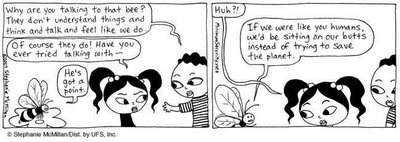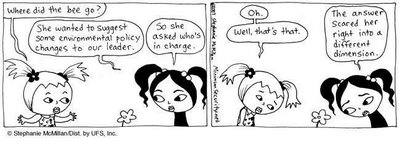Tuesday, April 17, 2007
Mobile phones, bees and the future
UPDATE: Article in LA Times:
ORIGINAL POSTING:
I'm wicked skeptical about reports of negative effects of mobile phones (brain cancer, etc.) when the public and the press can't seem to get worked up at all about way more direct, obvious problems like mobile phones and car crashes (and state legislatures pass stupid laws on same).
So now this report appears implicating mobile phones in the global collapse of bee populations, aka Colony Collapse Disorder or CCD, which, in turn, raises the possibility of crop failure since bee pollination is a critical-path link in many higher plant systems.
Now my very good friend Jim Baller, whose judgement I trust, writes on DewayneNet Technology List,
If the cell-CCD link is confirmed, this has the makings of a major wildcard incident. Imagine a world without mobile phones. Imagine a world without other mobile RF devices -- after all, who knows what the underlying mechanism might be? Alternatively, imagine a world that ignores what might turn out to be a valid scientific result, and the massive food crop failure (and other biotic effects) that might obtain.
As usual, Stephanie McMillan at "Minimum Security" is out in front of this issue.


Stephanie told me a long time ago that I could publish her toons with attribution. Thank you, Stephanie. [link to her blog]
A fungus that caused widespread loss of bee colonies in Europe and Asia may be playing a crucial role in the mysterious phenomenon known as Colony Collapse Disorder that is wiping out bees across the United States, UC San Francisco researchers said Wednesday . . . the results are "highly preliminary" . . . UCSF biochemist Joe DeRisi said. "We don't want to give anybody the impression that this thing has been solved." . . . entomologist Diana Cox-Foster of Pennsylvania State University [said] . . . "We still haven't ruled out other factors, such as pesticides or inadequate food resources following a drought," she said. "There are lots of stresses that these bees are experiencing," and it may be a combination of factors that is responsible.[Thanks for this update to Rob Berger via Dave Farber's IP List]
ORIGINAL POSTING:
I'm wicked skeptical about reports of negative effects of mobile phones (brain cancer, etc.) when the public and the press can't seem to get worked up at all about way more direct, obvious problems like mobile phones and car crashes (and state legislatures pass stupid laws on same).
So now this report appears implicating mobile phones in the global collapse of bee populations, aka Colony Collapse Disorder or CCD, which, in turn, raises the possibility of crop failure since bee pollination is a critical-path link in many higher plant systems.
Now my very good friend Jim Baller, whose judgement I trust, writes on DewayneNet Technology List,
This sounds nutty, but I wouldn't dismiss it until we learn more. This article mentions a Dr. George Carlo, "who headed a massive study by the US government and mobile phone industry of hazards from mobiles in the Nineties." I was legal counsel to George and the scientists who conducted that study. George is a really conscientious guy, and his group did extraordinarily good work -- the results of which the cellular industry really hated.The report mentions an experiment where bees left hives when a cell phone had been left nearby. Did they do the obvious control experiment and leave a cell phone that had been turned off? Critical information has yet to be established. Are there fewer bee colonies near cell towers? Has the analysis of covariance been done to try to tease apart cell density from population density?
If the cell-CCD link is confirmed, this has the makings of a major wildcard incident. Imagine a world without mobile phones. Imagine a world without other mobile RF devices -- after all, who knows what the underlying mechanism might be? Alternatively, imagine a world that ignores what might turn out to be a valid scientific result, and the massive food crop failure (and other biotic effects) that might obtain.
As usual, Stephanie McMillan at "Minimum Security" is out in front of this issue.


Stephanie told me a long time ago that I could publish her toons with attribution. Thank you, Stephanie. [link to her blog]
Technorati Tags: Cellco, Environment, JimBaller, MobileApps, toons
Comments:
I saw some coverage of this recently myself, and my personal knee-jerk reaction was also that it was crap -- though, not having lived in Mass for 26 years, I didn't use the word 'wicked' in my thought :-).
The descriptions of spread that I've heard don't seem to match, epidemiologically, any patters of spread of any cell phone technologies that I'm familiar with, and the NYT coverage of this seems to implicate the travel of itinerant pollinators pretty strongly...
Post a Comment
The descriptions of spread that I've heard don't seem to match, epidemiologically, any patters of spread of any cell phone technologies that I'm familiar with, and the NYT coverage of this seems to implicate the travel of itinerant pollinators pretty strongly...





